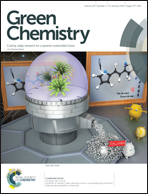Enzymatic synthesis of temperature-responsive poly(N-vinylcaprolactam) microgels with glucose oxidase
Abstract
In this work we report for the first time facile enzymatic synthesis of aqueous temperature-responsive poly(N-vinylcaprolactam) (PVCL) microgels with a glucose oxidase (GOx)-based initiation system. GOx catalyzes the oxidation of β-D-glucose to D-glucono-lactone and hydrogen peroxide by the consumption of molecular oxygen. The addition of ferrous ions (Fe2+) induces the formation of hydroxyl radicals from the hydrogen peroxide, which act as initiating species for the microgel synthesis. PVCL microgels were synthesized by precipitation polymerization initiated by the enzyme and a conventional azo-initiator 2,2′-azobis(N-(2-carboxyethyl)-2-methylpropionamidine) tetrahydrate (ACMA) (reference). In the performed polymerization runs, the content of the crosslinker N,N′-methylenebisacrylamide (BIS) as well as the amounts of the GOx/Glu/Fe2+ and conventional azo-initiator ACMA were varied. The polymerization process was analyzed by reaction calorimetry and it was found that enzymatically initiated polymerization is slower compared to the conventional process, and leads to lower polymer yields. The nucleation and growth of the microgels was investigated with in situ dynamic light scattering. Dynamic light scattering experiments performed at different temperatures confirmed the temperature-responsive behavior of the obtained PVCL microgels. We demonstrate that the use of enzymes in precipitation polymerization leads to the encapsulation of enzymes in formed microgels. After the GOx-induced polymerization and purification of the microgels, high enzyme activity could be determined in the microgels, enabling facile synthesis of core–shell microgels and interesting application possibilities.



 Please wait while we load your content...
Please wait while we load your content...